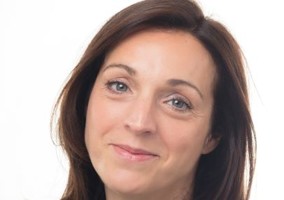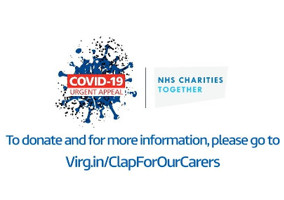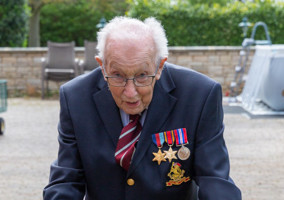Running NHS Charities Together during 2020 at the onset of the pandemic, was like “building the plane whilst flying it,” said the charity’s chief executive.
Ellie Orton, chief executive of NHS Charities Together, said: “There was a lot of very quick learning, a lot of very quick reflection, and a lot of quick implementation.”
Orton was speaking at a panel at Civil Society Media’s Spring Summit, alongside Ian Lush, chair of NHS Charities Together.
In March 2020, as Covid-19 was hitting the country and the NHS in such a significant way, the charity decided to launch a national appeal.
“Nobody had heard of us before, I think it's reasonable to say. Within the NHS itself let alone within the public, obviously everybody's heard of the NHS, but NHS charities were known as the sleeping giant of the NHS - this really well hidden, but really vital partner,” she said.
The appeal brought in £10m on the first day and within six weeks the charity raised £100m. It was supported by Captain Tom Moore.
At that point, the charity had only four members of staff, and nobody was a fundraiser. At the end of the year, it had raised £150m, set up the grant programme for its members, and welcomed 100 new members.
Orton said: “It was definitely a time where we learnt to communicate a lot, to trust each other, and for me to surround myself with the best people that I could to help us on that journey.”
She said the charity is still developing and that: “Last year was building the plane whilst flying it.”
How did the charity deal with this growth?
Ian Lush, chair of NHS Charities Together, said: “We had some really difficult conversations, it's fair to say that there were two or three members of the board who were very concerned about the pace of change, rightly worried about the governance issues of suddenly going from an organisation with a turnover of £450,000 a year to an organisation bringing in literally £100m plus.”
He added: “We knew there was going to be a lot of scrutiny, all over the press - that brings with it a lot of challenges. So it was difficult.”
Ultimately, they made the decision to form an executive subgroup, “to try to make those rapid decisions which couldn't wait for a board meeting, even though they're meeting weekly”.
He said: “That caused some uncomfortable meetings because obviously, it felt a bit like having a two-tier board. But we had a vision for the organisation and we were in the middle of what was clearly, from those of us who work in and around the hospitals, a massive crisis. So it does focus your mind.”
Nonetheless, Lush said: “We had to learn about how you involve people, even when you've got really rapid decisions to make, and the two-tier thing - I wouldn't do again, even though at the time it seemed the best solution to a crisis, but it was very divisive and looking back I think it's the thing that I would do differently if I went through it all again.”
Since then, the team has been expanding. For Orton, this has felt a bit like a “bereavement” and she is keen that the new members of staff feel as much as part of the charity as others.
She said: “So it is a very different approach to leadership. It still needs the level of listening, but actually, now it's about what the team is doing. And actually, that feels a little bit like a bereavement in some sense.”
The charity is still “a rapidly changing organisation” and Orton is figuring out what the team needs in terms of leadership styles.
She is expecting that it will become “less centred on me as the conductor, and more centred on a more collective vision”.
For Orton, one of the things she is “really acutely aware of now” is about those people that have joined recently, “that they have the same sense of identity within the organisation”.
She wants those staff to have the “same level of ownership and sense of mission.”
‘Above everything else is honesty’
Lush said: “I think what we learnt very quickly is that almost what matters above everything else is honesty and not pretending you're fine about something if you're not, and being very open about your feelings about your concerns and then addressing them.”
Orton said: “That level of consultation that I think we've always had as a membership organisation and that openness and that honesty and that continuing to listen, is something that I will certainly take forward, and certainly one of the things that I learned is that I think we did the absolute best that we could do with the situation and, and I'm so proud of the contribution that absolutely everybody made within the team.”
For example, she said: “One of the things that I think we really improved on between the relationship between myself and the board was the board quite often asked me for assurances, but they didn't give me a definition of what that meant.
“So I didn't know how to give them the assurances or even whether they were reasonable assurances to be able to give them. So over the last year we certainly have been able to define what that meant.”
Lush added: “I think [this dialogue] was healthy and I think we were coming at it from the same vision, but perhaps from two sides of the governance coin and that was really important.”
Orton echoed his sentiment, and said: “We were prepared to have the difficult conversations with each other, and we were prepared to listen to each other because we both had the same sense of purpose.”
Where next?
For Orton, going back to being a smaller charity with an income of £350,000 a year “might feel like a bit of a failure” but “there's probably a middle ground” in terms of income.
Lush said: “We are the official NHS charities. Now that we've demonstrated what a difference our individual members make, but also what we can do collectively, we do need to build on that.
“Now, we're not going to raise £155m year on year ... but we can raise significant sums and we know from the people we've already built partnerships with there is considerable interest in being alongside the NHS and there's still masses to do,” he added.
Related articles
Ellie Orton: 'What really attracted me was the potential'
Russell Hargrave talked to Ellie Orton, chief executive of NHS Charities Together, about working with Captain Tom and the challenges of handling multi-million-pound growth.












